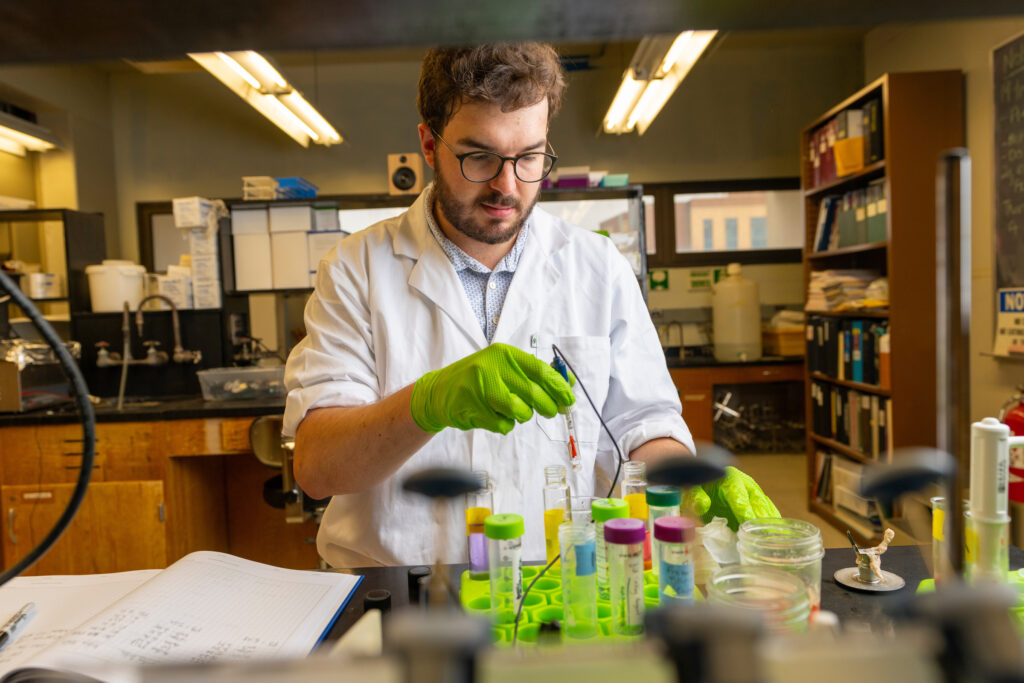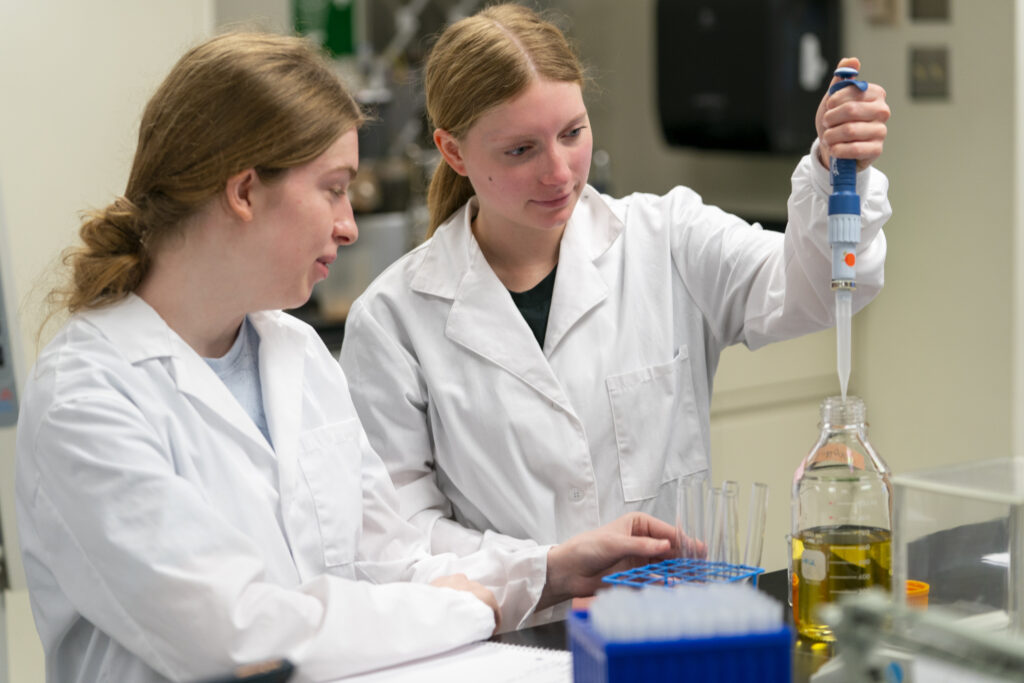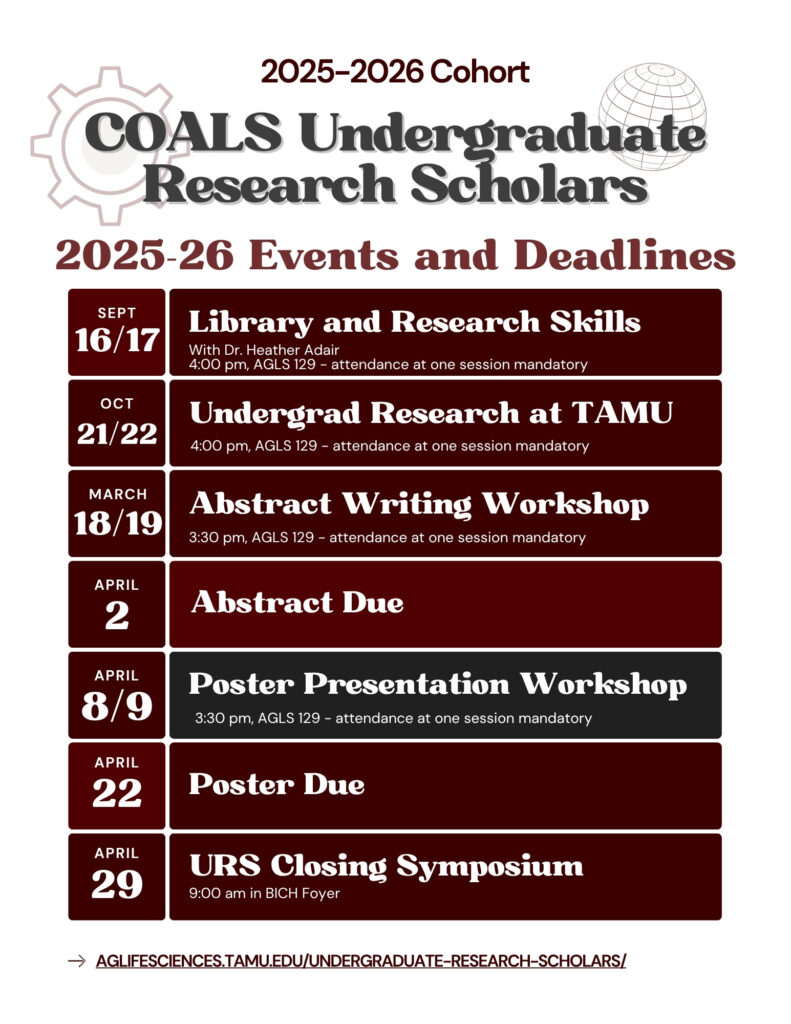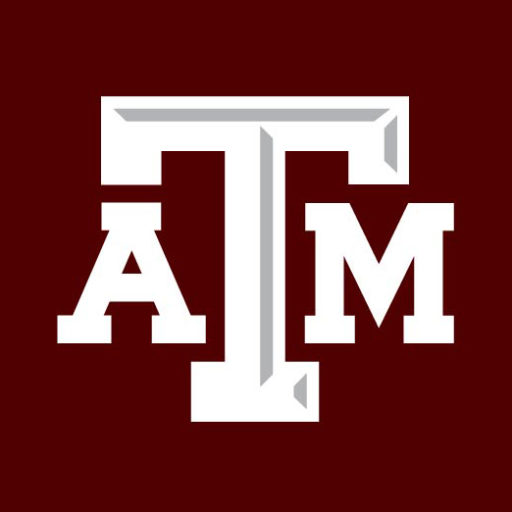
Spanning the academic year, the Undergraduate Research Scholars Program encompasses research projects that begin in Fall 2025 and conclude in Spring 2026, culminating in a showcase of scholars’ work through both poster and oral presentations at a research symposium.
To ensure the success of these research experiences, the program provides professional development activities, including how to connect with a faculty mentor, proposal preparation, abstract writing, and presentation preparation, guiding students through the critical stages of their research experiences.
Upon successful completion of the program, each scholar is awarded a $1,000 scholarship as a recognition of their dedication and hard work. Additionally, faculty mentors, who play a crucial role in guiding and supporting the scholars throughout their research journey, are eligible to receive up to $500.
This funding is intended to cover various costs associated with the research, including materials, travel, or other necessary expenditures, ensuring that both scholars and mentors have the resources they need to achieve excellence in their research endeavors.
2025-2026 Undergraduate Research Scholars
| Proposal Title | Student | Major | Faculty Member | Faculty Dept |
|---|---|---|---|---|
| Structural Visualization of Programmed Ribosomal Frameshifting in Bacteriophage-Infected Bacteria | Khalid Abdelhamid | Bioenvironmental Science | Jungie Zhang | BCBP |
| Environmental Reservoirs of Antibiotic Resistance: A Molecular Surveillance Study in Agricultural Watersheds | Hajar Bennis | Bioenvironmental Science | Terry J. Gentry | SCSC |
| Aging-induced CD8 T cell dysfunction impairs hepatic insulin resistance | Ohm Brahmbhatt | Nutrition | Shaodong Guo | NUTR |
| Sensitivity, Accuracy, and Integration of Handheld XRF, FTIR, and Raman for Forensic Soil Analysis | Arwen Chen | Forensic and Investigative Science | Youjun Deng | SCSC |
| Development of Texas-style kimchi using regional produce and assessment of microbiome dynamics | Justy Chung | Food Science and Technology | Seockmo Ku | FSTC |
| Tawny Crazy Ant attraction to Sorghum Aphid honeydew | Brayden Clark | Entomology | Raul Medina | ENTO |
| Seasonal Changes in Blood Parameters between Migrant and Resident Species | Julia Hickman | Ecology and Conservation Biology Horticulture | Jacquelyn Grace | ECCB |
| Look into RXFP2 as a Causative Variant in Regards to Presence and Size of Scurs in the McGregor Population | Tess Homeyer | Animal Science | Clare Gill | ANSC |
| Environmental DNA detection of an endangered moss | Luis Hurtado | Ecology and Conservation Biology | Daniel Spalink | ECCB |
| The Role of frl operon Regulating Sliding Motility in Bacillus subtilis | Sarah Ingram | Biochemistry | Paul Straight | BCBP |
| Improving Germination Efficiency in Southern-U.S. Adapted Vitis Germplasm via Gibberellic Acid and Stratification Timing | Brooke Isbell | Plant and Environmental Soil Science Horticulture | Andrej Svyantek | HORT |
| Functionalizing Mitochondrial Proteome Through Machine Learning Approaches | Dimitris Kalafatis | Biochemistry | Vishal Gohil | BCBP |
| Expression, Purification, and Refolding of BCL-XL for NMR Analysis | Jayden Koti | Biochemistry | Josh Wand | BCBP |
| Tracking Soil Change in Urban Environments in Houston via Soil Archives and MIR Spectroscopy | Daniel Kwong | Plant and Environmental Soil Science | Felipe Aburto | SCSC |
| Identifying protein sequence for ER-targeting of melon HPL13. | Caleb Lehnertz | Horticulture | Hisashi Koiwa | HORT |
| Comparative Analysis of Fungal Endophyte Communities in Herbarium and Fresh Leaf Tissue | Kai Miller | Ecology & Conservation Biology | Daniel Spalink | ECCB |
| Improving Disaster Relief Communication for Livestock Producers in Texas | Tracer Rice | Animal Science | Summer Felton Odom | ALEC |
| Characterization of broad host range Burkholderia phage Bcep44681 and antimicrobial agent BceT44681 | Allyson Sokolowski | Animal Science | Jason Gill | ANSC |
| Genomic Characterization and Transformation of Munson Grape Cultivars for Disease Resistance | Aidan Souder | Horticulture | Amit Dhingra | HORT |
| Reassessing Pond Management Practices in Texas: A Contemporary Survey of Private Pond Owners | Davis Stairs | Rangeland, Wildlife, and Fisheries Management | Beth Silvy | RWFM |
| Copper chelator PSP-2 expands the therapeutic index of elesclomol | Fotoula Stroumpos | Genetics | Vishal Gohil | BCBP |
| Leadership Faculty and Students’ Perceptions of AI in the Classroom: A Pilot Study | Jolee Szafran | Agricultural Leadership and Development | Summer Felton Odom | ALEC |
| Leveraging Artificial Intelligence for Improved Sorghum Identification and Phenotypic Feature Extraction | Chloe Tilley | Plant and Environmental Soil Science | Seth Murray & Joshua Peeples | SCSC |
| Investigating the existence of circadian rhythms in circulating and storage levels of retinoids in mice | Robert Wagner | Nutrition | Masako Suzuki | NUTR |
| Assessing the Financial Risk of Agricultural Cooperatives in Texas | An Wang | Agricultural Economics | Ronald Crowe | AGEC |
| Reassessing Pond Management Practices in Texas: A Contemporary Survey of Private Pond Owners | Bridger Wilson | Rangeland, Wildlife, and Fisheries Management | Beth Silvy | RWFS |
Program Timeline
Eligibility
Student Eligibility:
- Undergraduate student with a primary major in any of the 15 departments within the College of Agriculture and Life Sciences
- Sophomore or Junior with an expected graduation date between May 2026 and May 2027
- Completed online Responsible Conduct of Research (RCR) Training
- Submitted research proposal, collaboratively developed with and approved by the research faculty mentor, by August 4, 2025
- Will be registered in the future for Fall 2025 and Spring 2026 XXXX-491 research credits
- Must commit to attending mandatory URS student development events
Faculty Mentor Eligibility:
- Primary faculty appointment is in one of the 15 departments within the College of Agriculture and Life Sciences
- Faculty have a XXXX-491 Research Section
- T/TT, APT, and AgriLife Faculty are all eligible to serve as research faculty mentors
- Collaboratively develop and approve the student’s research proposal, XXXX-491 credits and the student’s weekly time commitment
Submit Your Application Materials in InfoReady

- Student Name, UIN, primary major, expected graduation date
- Expected number of Fall 2025 XXXX-491 research credits
- Weekly time commitment for each semester (minimum of 3+ hours/week for 0-1 credits, 3+ hours for each additional credit hour)
- Responsible Conduct of Research (RCR) completion certificate
- Commitment to attend mandatory URS events
- 2-page proposal including an introduction, specific aims, methodology, expected results, potential pitfalls, and alternative approaches
- Faculty research mentor approval of the proposal, research credits, and weekly time commitment
Support Provided to the Student Research Scholar:
2025-2026 Cohort
- Library and research skills workshop – September 16 or 17, 2025, 4:00 – 5:00 pm
- Presentation on available research programming for undergraduate research scholars, October 21 or 22, 2025, 4:00 – 5:00 pm, AGLS 129
- Abstract Writing Workshop – March 18 or 19, 2026 (hybrid), 3:30 – 5:00 pm, AGLS 129
- Poster presentation workshop – April 8 or 9, 2026, 3:30 – 5:00 pm, AGLS 129
- Feedback from judges following the research symposium
- Awards for the best posters and oral presentations
Summer Preparations for 2025-2026 Cohort
- Recorded URS Program Information session (password *@K6Vi8y)
- Proposal Preparation Writing Workshop (mandatory attendance for at least one session)
- July 8, 2025, 3:30 – 5:00 pm or July 10, 2025, 10-11:30 am
- Register for the Zoom on this Qualtrics form
- Proposal Writing Worksheet

2024-2025 Undergraduate Research Scholars
| Proposal Title | Student | Major | Faculty Member | Faculty Dept |
|---|---|---|---|---|
| A Study of Relationships Among Artificial Intelligence Service Quality, Customer Satisfaction on Customer Engagement | Annemarie Williams | HMGT | Dr. Po-Ju Chen | HMGT |
| Applications of in vitro Pollen Tube Germination Assays in Cotton | Macie Powell | SCSC | Dr. David Stelly | SCSC |
| Character Development through Sport: Examining Differences in “fair play” in a Youth Tournament in Mexico | Alberto Espinoza | RPTS | Drs. Andrea Ettekal and Chad Nelson | ALEC |
| Cognitive Effects of Xylitol | Avery Dean | NUTR | Dr. Karen Beathard | NUTR |
| Cognitive Effects of Xylitol | Anna Tillinghast | NUTR (HHT) | Dr. Karen Beathard | NUTR |
| Environmental DNA Detection of an Endangered Moss | Luis Hurtado | ECCB | Dr. Daniel Spalink | ECCB |
| Establishment of Bovine Upper Airway 3D Organoid Model for Studying Mechanism | Olivia Trevino | POSC | Dr. Yuhua Farnell | POSC |
| How the Knowledge of Food Science and Nutrition Systems Effects the Nutritional Habits of Students | Morgan Marburger | AGCJ | Dr. Robert Strong | ALEC |
| Identification of De Novo Genes with Different Evolutionary Ages in A. Thaliana through Comparative Genomic Analyses | Nicole Rosenfeld | GENE | Dr. Claudio Casola | ECCB |
| Impact of Microbiome-Based Short Chain Fatty Acids on Mouse Colonic Organoid Growth and Gene Expression | Jennie Kim | NUTR | Dr. Robert Chapkin | NUTR |
| Isolation and Identification of Non-Toxic Monascus Strains for Safer Industrial Applications | Khadija Ayesha | FSTC | Dr. Seockmo Ku | FSTC |
| Let’s Welcome Artificial Intelligence, the New Boss of the Hospitality Industry | Kimberly Long | HMGT | Dr. Robert Huy Gip | HMGT |
| Mercury Levels of Nonmigratory Passerines – Potential Local Contamination Sources | Hannah Bretthorst | ECCB – Vertebrate Zoology | Dr. Jacquelyn Grace | ECCB |
| Optimizing Extraction Methods for Monascus Red Pigment | Ian Konvicka | FSTC | Dr. Seockmo Ku | FSTC |
| Overexpressing Melon CYP74 in Arabidopsis Thaliana and Transiently Transformed Melon to Characterize Subcellar Localizations of CYP74 and Volatile Profiles of Transformed Plants | Aidan Souder | HORT | Dr. Hisashi Koiwa | HORT |
| Role of Microbiome-Host Interaction in the Intersection of Metabolic Syndrome and Organophosphate Flame Retardant Exposure | Emma Thomas | NUTR | Dr. Jenny Wu | NUTR |
| The Behavioral Effects of Nosema Ceranae on Apis Mellifera Queens | Tara Lanning | ENTO | Dr. Juliana Rangel | ENTO |
| The Effect of Dietary Carbohydrate Composition on Cognitive Performance | Ryan Arenz | NUTR | Dr. Karen Beathard | NUTR |
| The Impact of Meal Timing on PCOS Risk During Adolescence | Ellie Goen | NUTR | Dr. Heidi Vanden Brink | NUTR |
| The Impact of Metal Pollutants on Amphibian Occupancy of Lentic Systems | Prineet Anand | BESC | Dr. Lee Fitzgerald | ECCB |
| The Impact of Selection and Drift on De Novo Gene Evolution and Retention | Catherine Chaison | GENE | Dr. Claudio Casola | ECCB |
| The Influence of a Field-Based Learning Curriculum on Attitudes and Behaviors of Natural Resources Management College Students and Recent Graduates | Caitlin Castro | RWFM | Dr. Beth Silvy | RWFM |
| The Influence of Sleep Quality on Polycystic Ovary Syndrome Risk During Adolescence | Savli Patel | NUTR | Dr. Heidi Vanden Brink | NUTR |
| Investigating Perceptions of Cannabis Among Young-Adult Users and How Product Packaging and Labeling Can Influence Consumer Behavior | Maci Guay | AGCJ | Drs. Holli Leggette and Benjamin Montemayor | ALEC; HLTH |
| Using 3D Renders of Keel Bones to Analyze Keel Bone Fractures | Cody Poole | POSC | Dr. Morgan Farnell | POSC |
Program Resources
- Orientation Recording and Transcript –
- Zoom Link (Email us at [email protected])
- Passcode: wDj$2xQ1
- Library Resources recording
- https://tamu.zoom.us/rec/share/IaQ1dlDBrOeEI6PbLrenhxUIAFUwKLMa477zI9yAbgA0xUtCPoq8I1_831L7YKyr.llNbjxIAM06mmmFt (Access Password: #6i??ff.)
- Undergraduate Research recording
- Proposal Writing Guide
- Responsible Conduct of Research (RCR)
Other Resources
Questions?
Dr. Craig Coates
Associate Dean for Programmatic Success
979-321-5780
[email protected]





